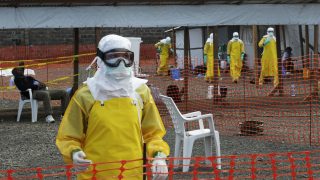Ten African countries comprising the Democratic Republic of Congo (DRC) and other neighboring nations have reached an agreement for the establishment of an Ebola coordination center.
The resolution to form the Africa Ebola Coordination Task Force (AfECT) was reached at a meeting held in Goma, for the purpose of adopting a framework to manage the on-going Ebola outbreak in the DRC.
AfECT is expected to complement the efforts of an existing technical centre for Ebola prevention – the Centre for Diseases Control which has an office in Nairobi.
According to Collins Boakye Agyemang, the communications personnel at the WHO, Africa Region, the taskforce’s main role is to get all the nine countries around the DRC to implement the same Ebola prevention protocols.
Particularly, it is expected to enhance the cross-border management of Ebola cases, with a view to preventing a repeat of the 2014 West Africa outbreak spanning four countries which killed over 11,000 people.
The center is also an extension of what Uganda, Rwanda, South Sudan, and Burundi had achieved through a memorandum of understanding for preventing the spread of the disease across the region.
Prior to now, the four countries had an agreement with the DRC that included certain areas of co-operation, such as training and information sharing, in the fight against Ebola.
“The purpose of the recent meeting in Goma was to extend this framework for co-operation and sharing of information to the other five countries considered to be at risk,” said Agyemang, adding that the aim is to “harmonize efforts, particularly in terms of data collection and sharing.”
The East African reports that Uganda, Rwanda, South Sudan, and Burundi are better positioned to carry out cross-border Ebola cases and laboratory surveillance. And in case an Ebola patient crosses into their countries, they have committed to communicating with the international community.
An advantage of the information-sharing plan is that it would help eliminate uncertainty around the spread of Ebola cases into other countries outside the DRC such as the Tanzania incident last month.
In addition to the Ebola virus, the task force will also be monitoring other disease outbreaks including cholera and measles currently plaguing the eastern and southern African regions.
Although the initial plan was come up with a prevention mechanism to manage the Ebola outbreak, some Ministers of Health present at the meeting said the AfECT should cover other epidemics as well.
“Initially the purpose of the framework was to enhance co-operation around Ebola,” said Agyemang. “Stakeholders agreed to extend this framework to include other epidemics, such as cholera and measles.”
The AfECT will be jointly-managed by the 10 countries – the DRC, Uganda, Rwanda, South Sudan, Burundi, Tanzania, Angola, Zambia, Central Africa Republic (CAR) and Zambia. The group of countries is also collaborating with the World Health Organization and the Centre for Disease Control.
While the political and advocacy arm of the AfECT will be hosted at the African Union (AU) office in Addis Ababa, its technical and operational component will be located at the WHO sub-regional office in Nairobi.








